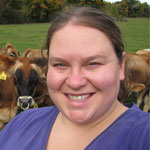
For the first year since COVID-19 happened, all but one of our annual farm tours are happening this year. I was genuinely shocked when I first heard that some farms won’t give tours. We have never turned down a farm tour. It’s our chance to show people what we really do, why we do it, and how much we care about it. But now, I can understand some people’s hesitancy. In case that’s you, I thought maybe I’d offer a few tips.
First off, know your audience. Our most common tours fall into three categories: kids, general farm knowledge, and scientific. For example, when the kindergarteners come, we talk about how we use the cow poop to make the corn grow, even if it’s stinky. But when the college level microbiology class comes, we discuss soil sampling, the nutrient breakdown of manure, the micro- and macronutrients needed by each of the crops we plant, and how we support them with different fertilizers and crop rotation. As you can imagine, those conversations go a little differently.
Determine a good flow through your farm to follow on each tour — and seriously follow it every time. It’ll help you remember the important points to share and make you more comfortable giving tours. For us, we start in the driveway with general knowledge of the farm, then we walk them down the feed alley of the milk barn. Next, we go to the parlor, then we end in the milk house. My big piece of advice? Always end with the calves. No matter what age group or why they’re there, you lose all their attention at the calves.
I think farm tours freak people out because they’re afraid to be called out by a militant vegan or animal activist, but it’s really not that scary. Talk to your visitors about your cows like you’d talk to me about your cows. It’s pretty hard to see a good dairy farmer in their element and not see or feel how much they care about what they do. If you’re nervous, I recommend doing each tour with a buddy or even reaching out to local dairy companies to ask if they’d be willing to help. My dad and I tag team each tour, and it definitely makes it easier.
I just think we’re in a place where turning down farm tours isn’t in our best interest. Maybe the answer has to be no sometimes, but you could also recommend them to someone else who does tours. We can’t complain that people don’t understand farming then be unwilling to help them understand farming.
My last piece of advice is to protect yourself a little. Before each college tour we do, I make it clear that they’re welcome to take and post photos, but I ask that they do so in a positive way. I tell them how much we care about our animals and what we do and that over the course of the tour, they should be able to feel that. I’m also upfront about how our life and farms are perceived, and I hope they’ll think about that when they’re sharing adorable cow photos.

The author dairies in partnership with her parents and brother at Spruce Row Farm in Pennsylvania. Jessica is a graduate of Pennsylvania State University, and since 2015, she has been active in promoting dairy in her local community. You can find her and her 250 Jersey cows on Facebook at Spruce Row Dairy or on Instagram at @seejessfarm.








